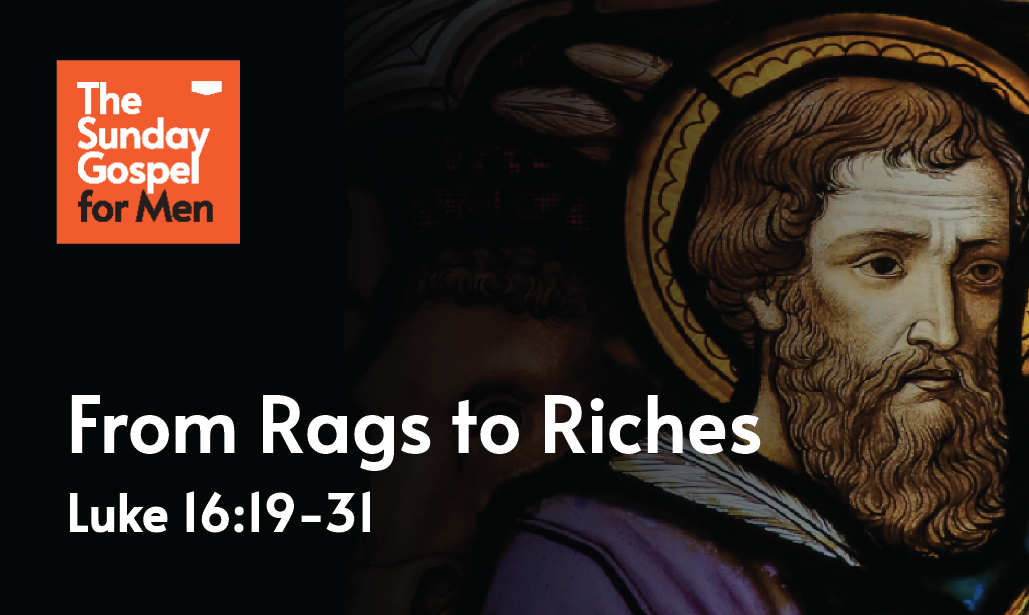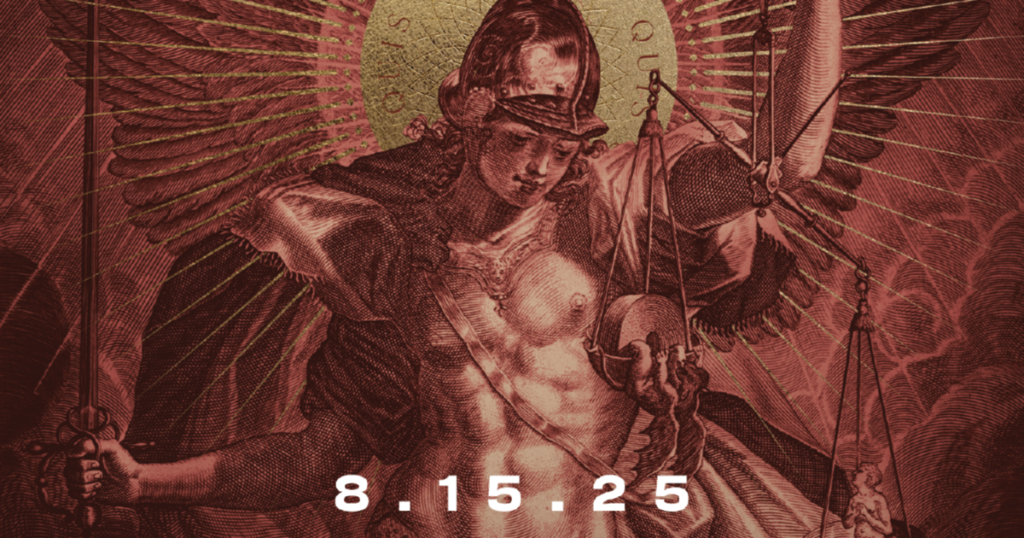For Sunday, September 25th, 2022
Reading
Jesus said to the Pharisees: “There was a rich man who dressed in purple garments and fine linen and dined sumptuously each day. And lying at his door was a poor man named Lazarus, covered with sores, who would gladly have eaten his fill of the scraps that fell from the rich man’s table. Dogs even used to come and lick his sores. When the poor man died, he was carried away by angels to the bosom of Abraham. The rich man also died and was buried, and from the netherworld, where he was in torment, he raised his eyes and saw Abraham far off and Lazarus at his side. And he cried out, ‘Father Abraham, have pity on me. Send Lazarus to dip the tip of his finger in water and cool my tongue, for I am suffering torment in these flames.’ Abraham replied, ‘My child, remember that you received what was good during your lifetime while Lazarus likewise received what was bad; but now he is comforted here, whereas you are tormented. Moreover, between us and you a great chasm is established to prevent anyone from crossing who might wish to go from our side to yours or from your side to ours.’ He said, ‘Then I beg you, father, send him to my father’s house, for I have five brothers, so that he may warn them, lest they too come to this place of torment.’ But Abraham replied, ‘They have Moses and the prophets. Let them listen to them.’ He said, ‘Oh no, father Abraham, but if someone from the dead goes to them, they will repent.’ Then Abraham said, ‘If they will not listen to Moses and the prophets, neither will they be persuaded if someone should rise from the dead.’” Luke 16:19-31
Reflection
In the Sermon on the Plain, Jesus gives a series of blessings regarding the spiritual life. He famously says: “Blessed are you who are poor, for the kingdom of God is yours. Blessed are you who are now hungry, for you will be satisfied” (Luke 6:20-21). Immediately after this series of blessings, Jesus also gives a list of warnings in the sermon. Among them, he says: “But woe to you who are rich, for you have received your consolation. But woe to you who are filled now, for you will be hungry” (Luke 6:24-25). This sounds remarkably similar to today’s Gospel reading about the final destinies of the rich man and Lazarus.
To help understand today’s reading, think of the names of a few of your favorite restaurants. Take a moment. Are they Mexican, Italian, Chinese, or maybe Mediterranean? Perhaps something else? Now imagine being able to dine out and eat “sumptuously,” or lavishly, at the restaurant of your choice every day. This hypothetical scenario is akin to what the rich man was experiencing.
Now imagine that you are that rich man, and you encounter a beggar outside the restaurant lying on the ground. The beggar simply asks for something to eat—for some of your leftovers. Clearly, this poor person needs medical assistance. After all, they are lying on the ground and “covered with sores.” This most likely means that the person is crippled and cannot help himself. Furthermore, you encounter this beggar so often that you are on a first-name basis with them. Ironically, his name, “Lazarus,” is a Greek form of the Hebrew name “Eliezer,” which means, “My God helps.” But you do not choose to show God’s kindness to the beggar; rather, you flat-out ignore them.
Now observe how the roles are reversed when the rich man and Lazarus die. One goes from “rags to riches” while the other goes from “riches to rags.” When Lazarus passes, angels bring him “to the bosom of Abraham.” What does this mean? First, “bosom” signifies intimacy (see John 1:18, 13:23). Second, the “bosom of Abraham” was an ancient biblical idea of “being gathered to one’s people” at death (compare Genesis 49:33; Numbers 27:13; Deuteronomy 32:50).
However, the rich man has a different destiny awaiting him. In his torment, he cries out to Abraham, saying, “Father Abraham, have pity on me.” He was trying to have Abraham intercede for him just as Abraham had done for Sodom (see Genesis 18:16-33). Then the rich man makes an unbelievable request: “Send Lazarus to dip the tip of his finger in water and cool my tongue, for I am suffering torment in these flames.” Never once did he so much as lift a finger to help Lazarus when they were alive on earth. But now, he is asking for Lazarus to be his servant and to help alleviate his suffering. Abraham basically tells the rich man: “No can do. You made your choice already.”
When we go before Christ, he will ask us if we served him in our earthly life. If we are caught off guard by this and ask him, “Lord, when did we see you hungry or thirsty…and not minister to your needs?” (Matthew 25:44), then he will answer to us, “Amen, I say to you, what you did not do for one of these least ones, you did not do for me” (Matthew 25:45).
Take time today to ask yourself if you serve those in your life. Do you just walk by suffering people? Think of one person you can serve next week.





